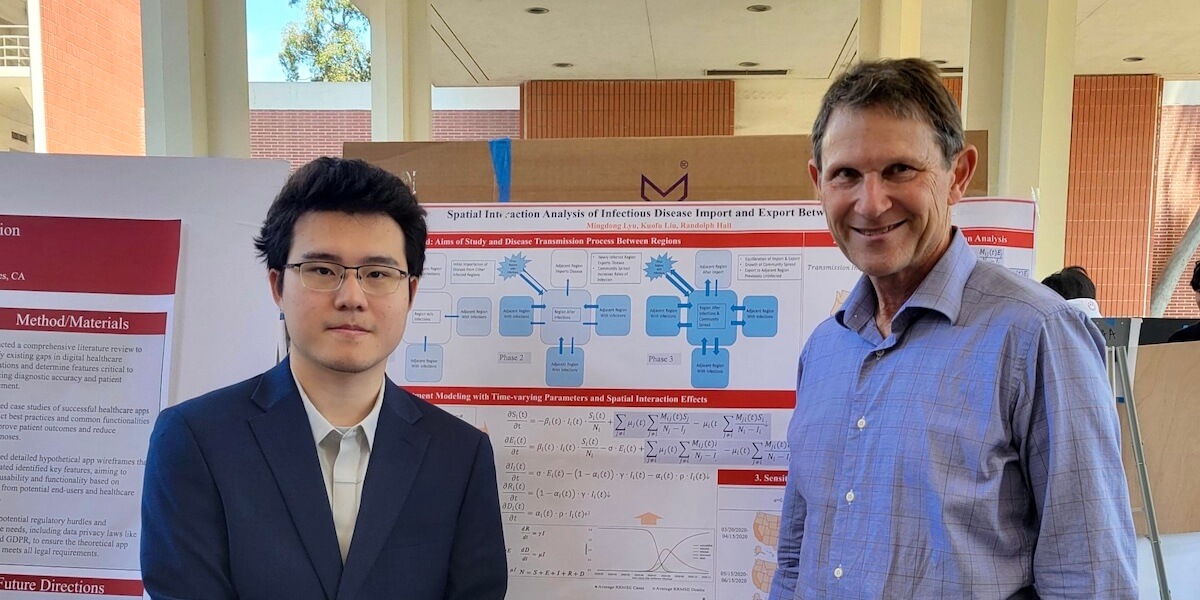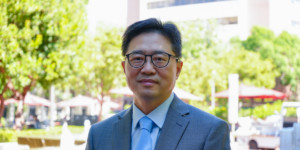
Kuofu Liu and Professor Randy Hall/ Image: Kuofu Liu
Kuofu Liu (B.S. ISE’ 24) is driven to make a difference with his research. Working under the supervision of Dean’s Professor of Industrial and Systems Engineering Randolph Hall, Liu has been focusing on modeling disease transmission and vaccine allocation to predict the spread of infectious diseases like COVID-19. He received the Viterbi School of Engineering’s Outstanding Undergraduate Research Award this year. With multiple co-author credits on prestigious journal submissions already under his belt, Liu will now take his background in impactful research to the University of Michigan for his Ph.D. in Industrial and Operations Engineering.
USC Viterbi spoke to Liu to find out more about his work.
Your research has focused on data modeling and optimization related to epidemics like COVID-19. Can you provide an overview of the specific projects you’ve worked on in this area?
My research aimed to understand how infectious diseases spread between populations and regions in the U.S., using COVID-19 as an example. Under the guidance of Professor Hall, we depicted the disease dynamics using a set of partial differential equations (known as compartment models) combined with machine learning and optimization methods.
What first sparked your interest in using industrial engineering methods to study and predict the spread of infectious diseases?
The pandemic greatly impacted everyone’s lives. As one of those whose lives were changed, I would like to understand the mechanisms of the disease spreading from a mathematical perspective. Methods in industrial engineering, such as mathematical modeling, optimization, and simulation, are great tools for quantitatively analyzing and predicting the transmission of infectious diseases.
In your research, you’ve utilized techniques like compartmental modeling and stochastic optimization. Can you explain what those methods involve and why they are valuable tools?
Compartment models divide the population into compartments based on disease status. The transitions between compartments are governed by partial differential equations that describe the rates of infection and recovery. Compartment models can simplify the disease dynamics and predict how an infectious disease will spread over time.
Stochastic optimization involves finding optimal solutions in uncertain scenarios. Stochastic programming accounts for randomness and variability in the model. It helps optimize the allocation of limited resources (e.g., vaccines) under uncertainty, ensuring the best possible outcomes, such as minimizing disease cases and deaths.
Professor Hall noted you’ve made contributions worthy of being a co-author on papers submitted to peer-reviewed journals, which is very impressive for an undergraduate. What has been the most rewarding or fascinating part of that research experience?
The most rewarding part of my research was learning from Professor Hall and my PhD mentors. They encouraged and guided me to become an independent researcher. Their rigorous approach to analyzing new results and perseverance in the face of obstacles helped me develop critical thinking skills. With their support, I gained confidence in my ability to tackle complex problems and contribute original ideas to the field.
You recently contributed to a new project on supply chain optimization for electric vehicle batteries. What has this work been like?
In this research, we are trying to use stochastic programming to design a closed-loop supply chain for electric vehicle battery recycling. For me, this research provides an opportunity to learn and adapt stochastic programming in a real-world context.
Beyond the technical aspects, what motivates and inspires you most about this field of research into disease modeling and epidemic analysis?
The research in infectious disease modeling made me realize my passion for work that has a tangible impact on human lives. For example, assessing and designing public health policies is a crucial aspect in this field. Effective public health policies should minimize disease risks while minimally interfering with people’s daily lives. In our newly published paper, we proposed suggestions for public health policies based on our analysis of disease transmission between states. This type of research is particularly compelling to me because it allows me to make a real-life impact with my work.
You’ll be continuing your studies as a PhD student at the University of Michigan next year. What are your goals for the next phase of your research career?
During my PhD, I aim to continue researching at the intersection of healthcare, optimization, and machine learning. I find the research process inherently interesting and rewarding, and I’m eager to make meaningful contributions to this field.
For other undergraduates interested in getting involved with research, what advice would you give them based on your own experience?
A word of encouragement for others and myself: Engaging in research means exploring questions for which clear conclusions do not yet exist. Be prepared for numerous challenges and obstacles along the way. Perseverance and passion will be your allies in navigating these challenges.
Published on June 6th, 2024
Last updated on June 6th, 2024













